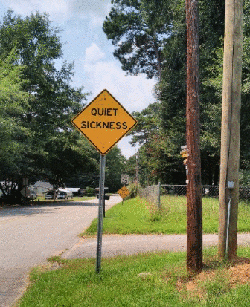PRETTY LADY CHRONICLES: Quiet Sickness
Overcoming a chronic illness or "sickness" can consist of a number of variables. While many are seen or expected, others are hidden in plain sight as environmental determinants. One such determinant is noise pollution.
Rather intentional, or not, noise pollution can directly affect an individual's quality of life, recovery efforts, or trigger a medical event. I recently experienced such an event that led me down a new path of advocacy and activism.
The backstory
Nature and gardening are both gateways to mental relaxation for me. So as you may imagine, I embrace being outdoors as much as weather permits. It was a nice sunny day, so I decided to sit outside and write.
I can hear the noise before seeing the bikes - dirt bikes. Unfortunately, we’ve had incidents of juveniles creating noise disturbances in our residential community with their dirt bikes, in addition to reckless driving and air pollutants through the exhaust. As previously advised, I decided to contact local authorities on this particular day.
Upon ending the call my heart began to race. Before I could even get my thoughts out, “Calm down Tina,” it happened. Just like that I’m calling back and requesting an ambulance.
Effects of noise pollution
Hearing loss
Prolonged exposure to loud noise can affect health. One of the known side effects is hearing loss. Unfortunately, we often don't consider conditions that may be particularly vulnerable to loud noise such as cardiovascular disease, multiple sclerosis, migraines, and sleep disorders.
Stress
Noise is a source of stress. It triggers reactions in the body, including the secretion of certain hormones such as adrenaline and cortisol. These reactions account for the development of heart and cardiovascular diseases after many years of exposure to noise.1
High blood pressure and heart attack
A greater risk of hypertension (high blood pressure) has been observed in adults chronically exposed to road vehicles and aircraft noise. Similarly, a greater risk of a heart attack in adults chronically exposed to noise from road vehicles was also noted.2
Other conditions
Some patients with multiple sclerosis have experienced sensory overload as a result of loud noise which can lead to pain, confusion, and fatigue. Sometimes, sensory overload is related to myoclonus, a stimulus-sensitive symptom that can cause involuntary jerking of muscles. Environmental noise, especially when caused by transportation means, is viewed as a significant cause of sleep disturbances.3-4
Quiet sickness
Although noise pollutants can be unintentional, their effects may be damaging all the same. The loud noise disturbance in my neighborhood led to an increased heart rate for me. As a result, I was shocked by my internal defibrillator.
The advocate in me was ready to turn activist. Fortunately, the governing body in my community has measures in place to protect those of us that may be more vulnerable to noise pollutants due to health. After voicing my concerns with the Councilwoman for my district, she took charge. Within a week, city crews were installing the much-needed "Quiet Sickness" sign.

A quiet sickness sign near me.
Quiet!
I must admit, I had never heard of a "Quiet Sickness" sign prior to my move to this community. A quick internet search would come up with limited information, or other blogs inquiring the same. As baffling as the sign may appear to many online, the meaning is just as simple. Quiet, sickness.
So, if you happen to see this sign in your view, lower your radio's volume, don't rev your engine, or race your dirt bike the opposite way. All it takes is a little consideration to momentarily lower your tones to support someone else's health. It matters. Shhhhh, Quiet Sickness!
Have you ever had to deal with loud noises? Share your story about it with our community!

Join the conversation